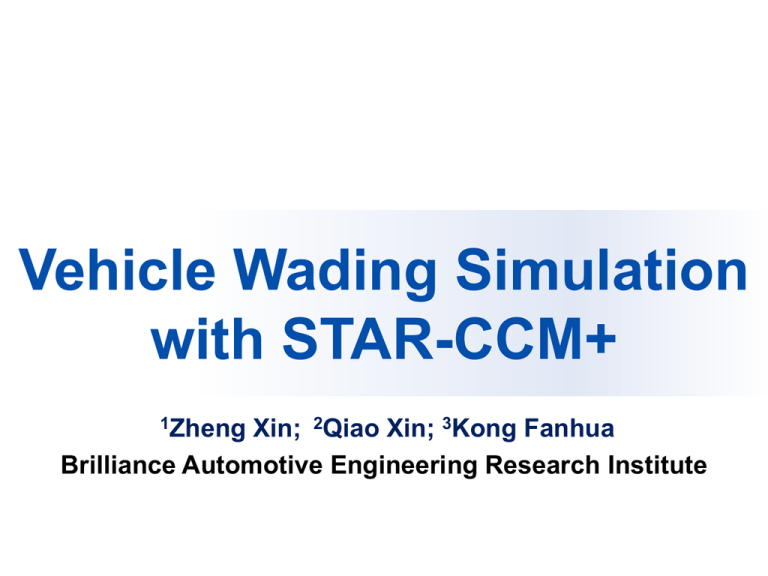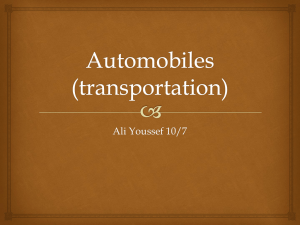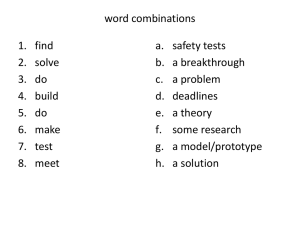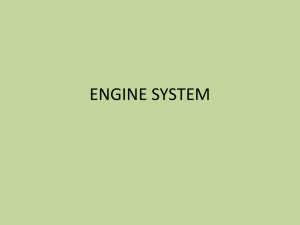SGC 2014 Presentation Brilliance Automotive Engineering
advertisement

Paper Reference No. F2012-E03-005 Vehicle Wading Simulation with STAR-CCM+ 1Zheng Xin; 2Qiao Xin; 3Kong Fanhua Brilliance Automotive Engineering Research Institute SUMMARY INTRODUCTION CALCULATION MODEL ESTABLISHMENT AND PROJECT ANALYSIS RESULTS AND ANALYSIS CONCLUSION INTRODUCTION Serious car wading would result in situations below: Waded car is easy to have its circuit interface and sockets wetted; Firewall seepage; Short circuit, water entering air inlet pipe will lead to air cylinder watering; Poor lubrication, increasing parts wearing and fuel consumption, and so on. INTRODUCTION Because of the firewall seepage; To find out the main point of water seepage; The CFD software STAR-CCM+ was employed to simulate the car wading. CALCULATION MODEL ESTABLISHMENT Based on a CAD car model; All parts and units inside the engine bay, front grille, wheels and car body’s outer surface were chosen respectively to generate a simulation space. First, creat the triangular meshes with Hypermesh,as shown at above Figure, that makes model connection and mesh quality improvement relatively easy. Then, provide the output format of Nastran. CALCULATION MODEL ESTABLISHMENT The surface grids Hypermesh Surface Mesh About 200,000 grids The volume grids STAR-CCM+ Volume Mesh About seven million PROJECT ANALYSIS Table 1 Projects projects (I) (II) (III) (IV) Wading depth 100mm 100mm 200mm 200mm Driving speed 30kph 10kph 30kph 20kph Two fluid media of water and air was used in the analysis. Speed entrance boundary conditions were used for entrance. Entrance speed was set according to actual road condition speed, as shown in table 1 . RESULTS AND ANALYSIS project I project II project III project IV Display Volume Fraction of Water on Firewall at Different Wading Depths and Driving Speeds RESULTS AND ANALYSIS Road Test Compared to project IV RESULTS AND ANALYSIS Added protective panel It has been seen from project IV that there was a lot of water in the center of firewall, where water seepage could always be seen. For this concern, a protective panel was added to the engine bottom, as shown in above Figure Aiming at stopping water back firing from the bottom and impacting the firewall. RESULTS AND ANALYSIS (1) project IV (2) Modified project Figure 1, water entering the engine bay was divided into two. One went from grille, passing through intermediate cooler, condenser, radiator and fan, and impacted the engine body. The other washed the engine bottom, turned upward through the firewall and impacted the engine at the reverse side. Figure 2, water washed the firewall from the engine bottom was stopped by the newly added engine bottom protective panel, which cut off the water flowing directly to and impacting the firewall. RESULTS AND ANALYSIS Volume Fraction of Water on Firewall (1) project IV (2) Modified project Pressure Distribution over Firewall CONCLUSION (1) More accurate pressure distribution and water-on volume fraction of all parts and units during the whole process of car wading. (2) By adding the engine bottom protective panel, water seepage at firewall was reduced. The modified project is rational. (3) By use of CFD in product development, greatly shorten the development cycle and save the development cost. (4) Analysis results are of important value for reference to the design and development staff in optimizing product design. Deficiency of this article is that it lacks verification of overheat that might occur in the engine bay due to addition of the engine bottom protective panel. That will be covered later in our work. Thanks for your attention Contact Me Name: Zheng Xin E-mail: xin.zheng@brilliance-auto.com Phone: 15802450824








